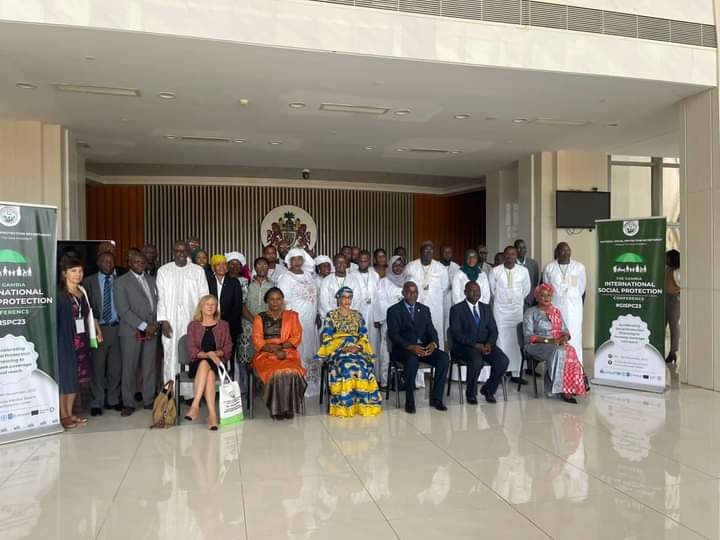
By Buba Gagigo
A three-day international conference on social protection is currently underway at the Sir Dawda Kairaba Jawara Conference Center in Bijilo.
The conference opened with remarks from Vice President Muhammed BS Jallow. Other dignitaries in attendance included Minister of Finance and Economic Affairs Seedy Keita, First Lady Fatoumata Bah Barrow, and UN Resident Coordinator Seraphine Wakana.
The Gambia’s first National Social Protection Policy (NSPP) for the period 2015-2025 was formulated with the objective of mitigating poverty and vulnerability in alignment with the Government of The Gambia’s Vision 2020 and the 2012-2015 Programme for Accelerated Growth and Employment (PAGE). The NSPP was developed through extensive consultations with key ministries, sub-national governments, community leaders, development partners, civil society, the private sector, and local communities.
Cordou Jabang-Senghore, the permanent secretary at the Office of the Vice President, emphasized the importance of this conference as an opportunity for government, development partners, civil society, and beneficiaries to engage in candid discussions about the social protection agenda and delivery system.
“Today is an opportunity for government, development partners, civil society, and beneficiaries to interface and discuss with frankness and genuine passion towards the social protection agenda and delivery system. Delegates of this international conference will discuss objectively issues of fundamental importance, the pathway and vision of social protection in the Gambia and around the world,” she stated.
H.E. Muhammed BS Jallow, the Vice President of The Gambia, who represented President Adama Barrow, outlined the key areas of focus for the social protection policy. These areas include safeguarding the welfare of the most vulnerable populations, protecting vulnerable populations from temporary shocks, promoting the livelihoods and income of economically active individuals in vulnerable situations, reducing exposure to social risks and vulnerabilities, and enhancing leadership, governance, and the social protection system for the effective design and delivery of programs.
“Our social protection system consists of the following prior two areas. One, safeguard the welfare of the poorest and most vulnerable populations; two, to protect vulnerable populations from transitory shocks; three, promote livelihoods and income of the poorest and vulnerable economically active population. Number four, reduce people’s exposure to social risks and vulnerabilities. Including discrimination and exclusion, and five strengthen leadership governance and social protection system in order to design and deliver effective and efficient programs,” Muhammed BS Jallow, the Vice President of the Gambia said on behalf of the president.
Ms. Seraphine Wakana, the United Nations Resident Coordinator, highlighted the pivotal role of social protection in addressing global challenges such as poverty, vulnerabilities, and inequalities. She emphasized that collective commitment to social protection is essential for effectively tackling these issues and accelerating progress towards achieving the UN Sustainable Development Goals.
“As we gather here today, we are reminded of the enduring challenges that exist in our world, including poverty, vulnerabilities and inequalities. These challenges none no borders, and affect individuals in every corner of the globe. It is only through our collective commitment to social protection, that we can address these issues effectively,” she said.
Ms. Wakana also noted the setbacks caused by the COVID-19 pandemic and the triple crisis of food, energy, and finance in the pursuit of the SDGs. She stressed that social protection can act as an accelerator in achieving many of the SDG targets, from eradicating poverty and hunger to promoting gender equality, improving access to health and education, addressing inequality, and addressing climate change.
“For the first time since the adoption of the SDGs there was a reversal of the trend of progress due to the impact of these global shocks and the UN and broader stakeholders recognized the pivotal role social protection can play as an accelerator of the achievement of many and even most of the SDG targets from ending poverty and hunger to improving gender equality and access to health, education, and even in tackling inequality, and climate change,” said Ms. Seraphine Wakana, UN Resident Coordinator in the Gambia.
Seedy Keita, the Minister of Finance and Economic Affairs, underscored the conference’s theme, “increasing social protection financing to increase coverage and rates,” as a reflection of the government’s commitment to social protection. He emphasized the role of social protection in breaking the cycle of poverty, fostering economic growth, and promoting shared prosperity and social justice.
“This is underpinned by all conviction that social protection is the bedrock of development. Research in both academia and policy circles has proven beyond reasonable doubt the impact of social protection, and financing on breaking intergenerational poverty and propelling economic growth for shared prosperity and social justice. And as I mentioned, the development agenda of His Excellency the President is inclusive and will always carry along the vulnerable members of society, is a government that every citizen should see themselves in regardless of their social standing.
Minister Keita also explained that social protection in The Gambia is funded through various sources, including the government, development partners, and NGOs. The government allocates funds through the budget to support various sectors, aligning with the Declaration on Development Financing, which promotes domestic resource mobilization as a sustainable method for financing social protection.
“The partners continue to support investing in our people through multiple channels. The government continues to channel funds through the budget into various sectors, such as protecting motor to sectoral interventions, and allocating domestic resources is in line with the Declaration on Development Financing, which states that domestic resource mobilization is the most sustainable mechanism of financing social protection,” he said.
In conclusion, Seedy Keita affirmed the government’s commitment to social protection in accordance with its international commitments and collaboration with partners. This commitment is reflected in the national development plan and aims to enhance household resilience and establish safety measures to address vulnerabilities while leaving no one behind.
“Our commitment to social protection is articulated in the recovery focus and NDP 2023 to 2027 pillar five, which is the empowerment, social inclusion and leaving no one behind. It is anticipated to improve households’ resilience, and put in place safety measures to address vulnerabilities through social protection in conformity with our international commitments, and in collaboration with our partners,” said Seedy Keita, Minister of Finance and Economic Affairs.
